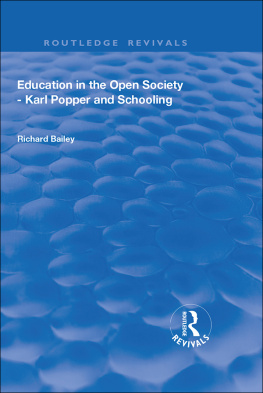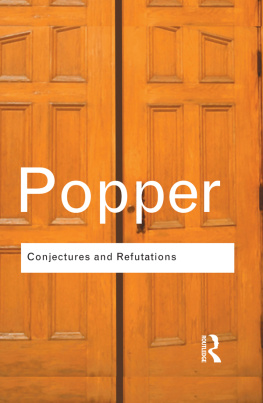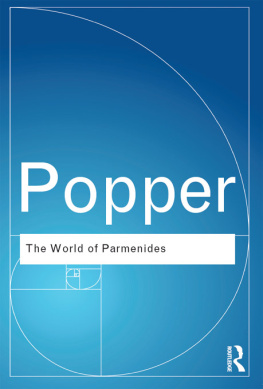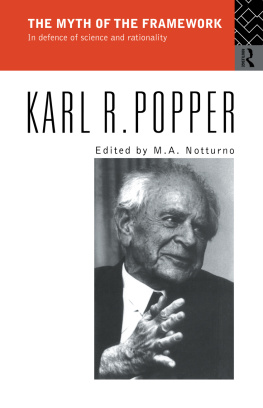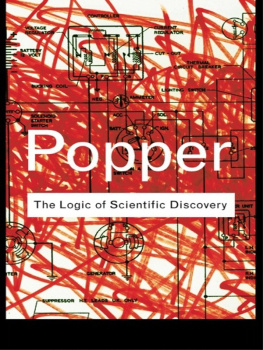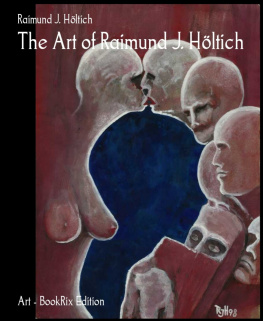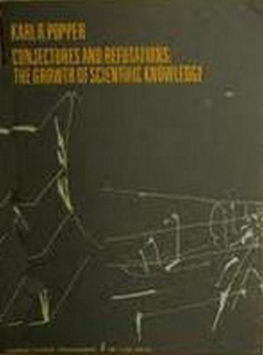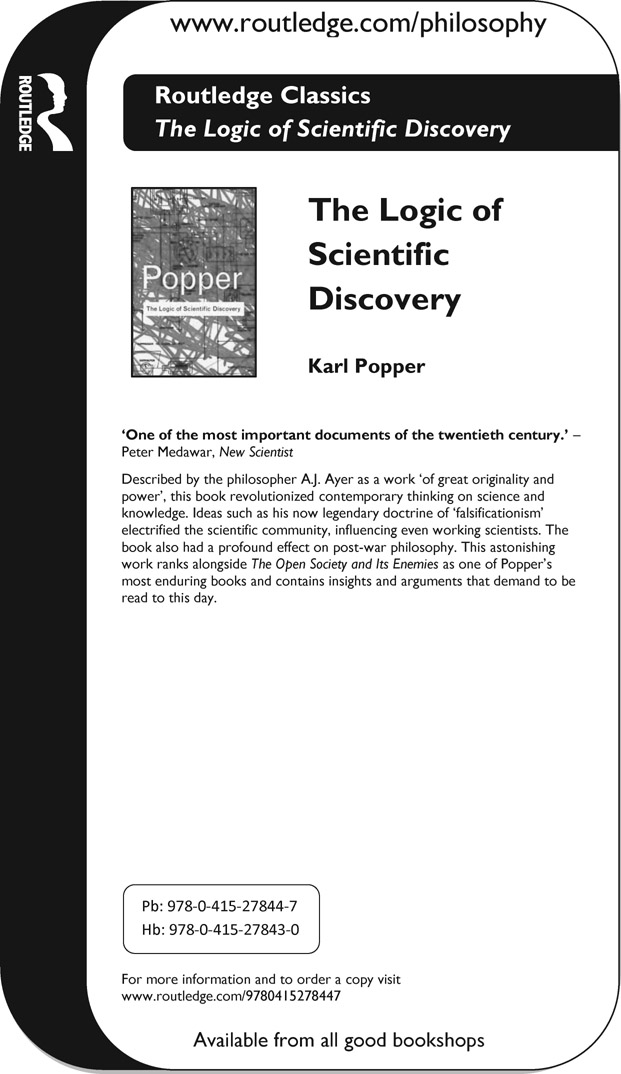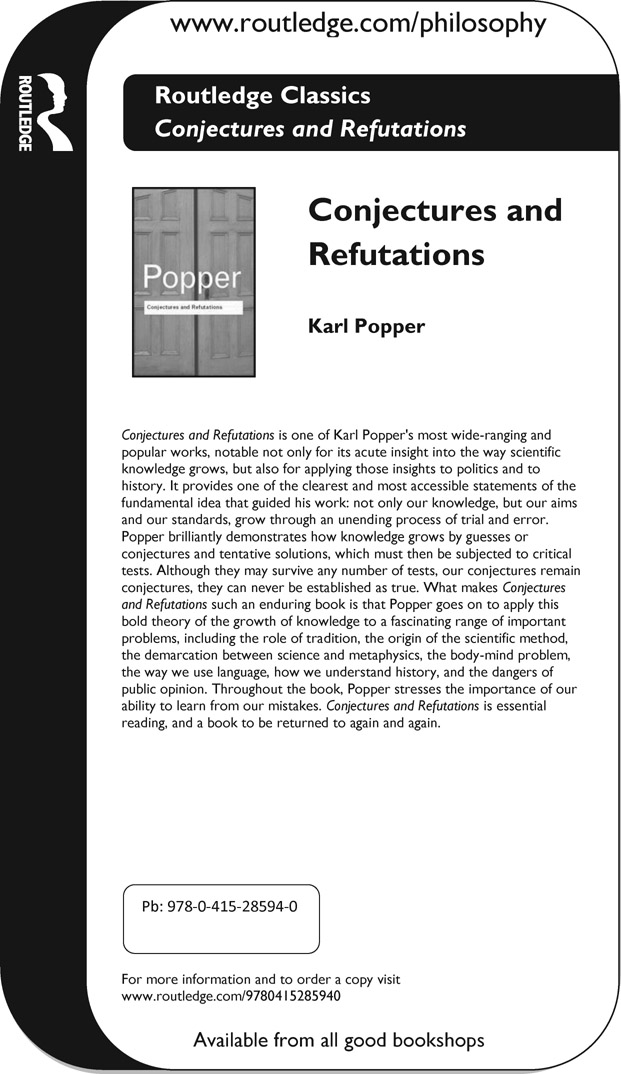Acknowledgements
I wish to express my gratitude to all my friends who have made it possible for me to write this book. Professor C. G. F. Simkin has not only helped me with an earlier version, but has given me the opportunity of clarifying many problems in detailed discussions over a period of nearly four years. Dr. Margaret Dalziel has assisted me in the preparation of various drafts and of the final manuscript. Her untiring help has been invaluable. Dr. H. Larsens interest in the problem of historicism was a great encouragement. Professor T. K. Ewer has read the manuscript and has made many suggestions for its improvement.
I am deeply indebted to Professor F. A. von Hayek. Without his interest and support the book would not have been published. Professor E. Gombrich has undertaken to see the book through the press, a burden to which was added the strain of an exacting correspondence between England and New Zealand. He has been so helpful that I can hardly say how much I owe to him.
C HRISTCHURCH , N.Z., April 1944 .
In preparing the revised edition, I have received great help from detailed critical annotations to the first edition kindly put at my disposal by Professor Jacob Viner and by Mr. J. D. Mabbott.
L ONDON , August 1951 .
In the third edition an Index of Subjects and an Index of Platonic Passages have been added, both prepared by Dr. J. Agassi. He has also drawn my attention to a number of mistakes which I have corrected. I am very grateful for his help. In six places I have tried to improve and correct quotations from Plato, or references to his text, in the light of Mr. Richard Robinsons stimulating and most welcome criticism ( The Philosophical Review , vol. 60) of the American edition of this book.
S TANFORD , C ALIFORNIA , May 1957
Most of the improvements in the fourth edition I owe to Dr. William W. Bartley and to Mr. Bryan Magee.
P ENN , B UCKINGHAMSHIRE , May 1961
The fifth edition contains some new historical material (especially on page 312 of volume I and in the Addenda ) and also a brief new Addendum in each volume. Additional material will be found in my Conjectures and Refutations , especially in the second edition (1965). Mr. David Miller has discovered, and corrected, many mistakes.
P ENN , B UCKINGHAMSHIRE , July 1965
K. R. P.
The Myth of Origin and Destiny
Platos Descriptive Sociology
Platos Political Programme
The Background of Platos Attack
The Rise of Oracular Philosophy
Marxs Method
Marxs Prophecy
Marxs Ethics
The Aftermath
Conclusion
Volume I
The Spell of Plato
It will be seen that the Erewhonians are a meek and long-suffering people, easily led by the nose, and quick to offer up common sense at the shrine of logic, when a philosopher arises among them who carries them away by convincing them that their existing institutions are not based on the strictest principles of morality.
S AMUEL B UTLER .
In my course I have known and, according to my measure, have co-operated with great men; and I have never yet seen any plan which has not been mended by the observations of those who were much inferior in understanding to the person who took the lead in the business.
E DMUND B URKE .
The Spell of Plato
For the Open Society ( about 430 B.C. ):
Although only a few may originate a policy, we are all able to judge it.
P ERICLES OF A THENS .
Against the Open Society ( about 80 years later ):
The greatest principle of all is that nobody, whether male or female, should be without a leader. Nor should the mind of anybody be habituated to letting him do anything at all on his own initiative; neither out of zeal, nor even playfully. But in war and in the midst of peaceto his leader he shall direct his eye and follow him faithfully. And even in the smallest matter he should stand under leadership. For example, he should get up, or move, or wash, or take his meals only if he has been told to do so. In a word, he should teach his soul, by long habit, never to dream of acting independently, and to become utterly incapable of it.
P LATO OF A THENS .
Volume II
The High Tide of Prophecy: Hegel, Marx, and the Aftermath
To the dbcle of liberal science can be traced the moral schism of the modern world which so tragically divides enlightened men.
W ALTER L IPPMANN .
The High Tide of Prophecy
1
Historicism and the Myth of Destiny
It is widely believed that a truly scientific or philosophical attitude towards politics, and a deeper understanding of social life in general, must be based upon a contemplation and interpretation of human history. While the ordinary man takes the setting of his life and the importance of his personal experiences and petty struggles for granted, it is said that the social scientist or philosopher has to survey things from a higher plane. He sees the individual as a pawn, as a somewhat insignificant instrument in the general development of mankind. And he finds that the really important actors on the Stage of History are either the Great Nations and their Great Leaders, or perhaps the Great Classes, or the Great Ideas. However this may be, he will try to understand the meaning of the play which is performed on the Historical Stage; he will try to understand the laws of historical development. If he succeeds in this, he will, of course, be able to predict future developments. He might then put politics upon a solid basis, and give us practical advice by telling us which political actions are likely to succeed or likely to fail.
This is a brief description of an attitude which I call historicism . It is an old idea, or rather, a loosely connected set of ideas which have become, unfortunately, so much a part of our spiritual atmosphere that they are usually taken for granted, and hardly ever questioned.
I have tried elsewhere to show that the historicist approach to the social sciences gives poor results. I have also tried to outline a method which, I believe, would yield better results.
But if historicism is a faulty method that produces worthless results, then it may be useful to see how it originated, and how it succeeded in entrenching itself so successfully. An historical sketch undertaken with this aim can, at the same time, serve to analyse the variety of ideas which have gradually accumulated around the central historicist doctrinethe doctrine that history is controlled by specific historical or evolutionary laws whose discovery would enable us to prophesy the destiny of man.
Historicism, which I have so far characterized only in a rather abstract way, can be well illustrated by one of the simplest and oldest of its forms, the doctrine of the chosen people. This doctrine is one of the attempts to make history understandable by a theistic interpretation, i.e. by recognizing God as the author of the play performed on the Historical Stage. The theory of the chosen people, more specifically, assumes that God has chosen one people to function as the selected instrument of His will, and that this people will inherit the earth.


